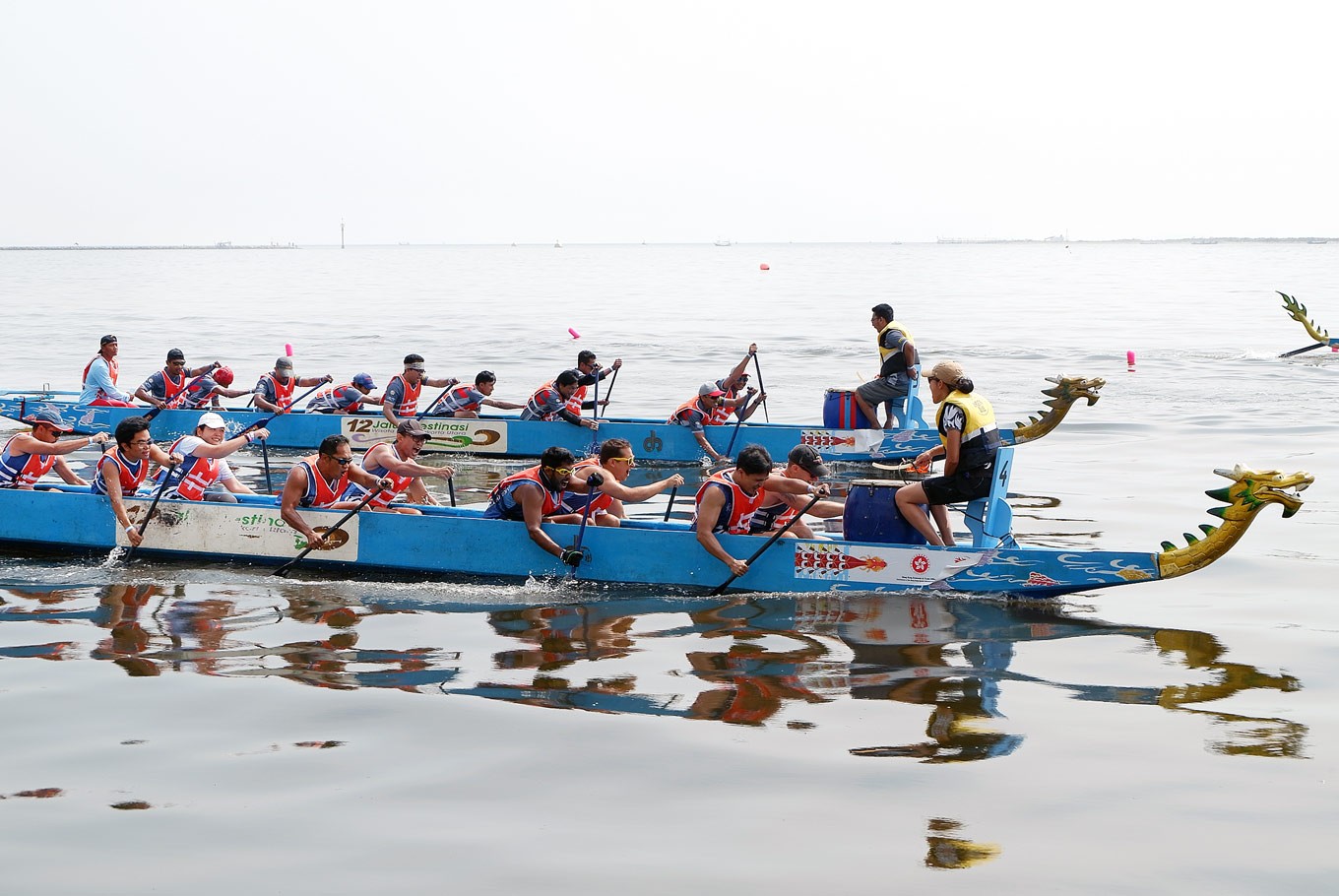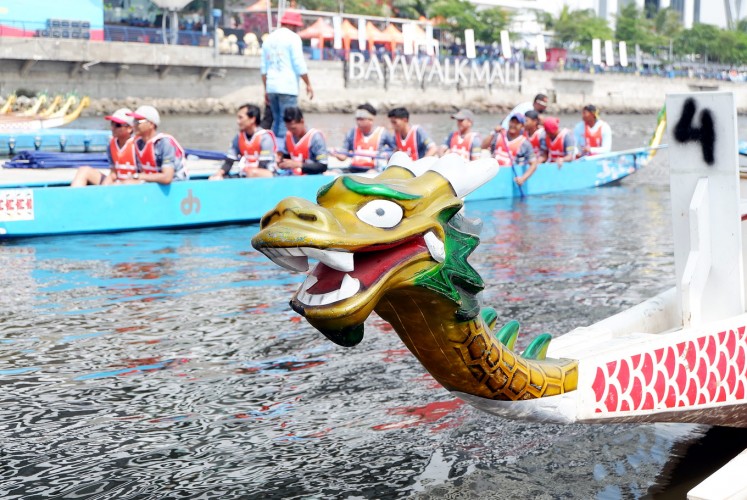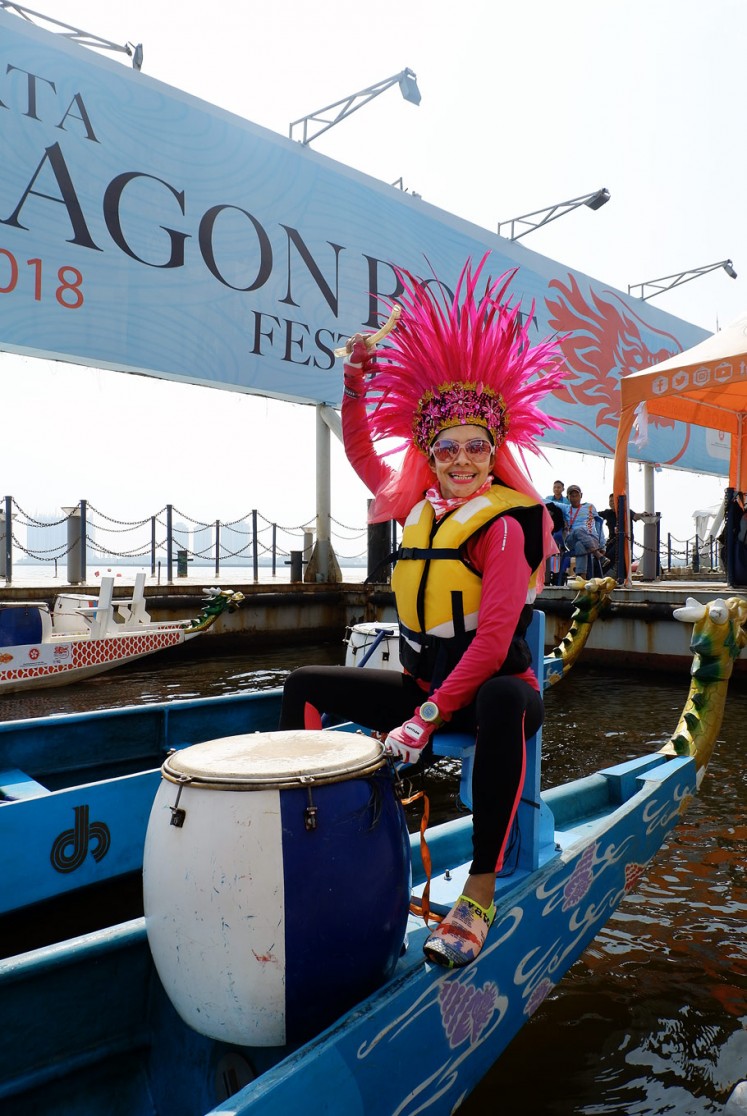Popular Reads
Top Results
Can't find what you're looking for?
View all search resultsPopular Reads
Top Results
Can't find what you're looking for?
View all search resultsReviving tradition in the second Jakarta Dragon Boat Festival
Change text size
Gift Premium Articles
to Anyone
I
n a boat race that fosters unity and celebrates Chinese tradition, hundreds of paddlers in the capital city roared like dragons recently.
Clad in pink shirts, 12 women — including the captain who wore an eye-catching pink feather headdress with a drum between her legs — were poised to cast off in a slim and long blue boat in Pluit, North Jakarta.
After the whistle was blown, the captain beat her drum and her crew paddled in short strokes. The louder she beat the drum, the more excited they became.
However, they were not alone because two other boats filled with the same number of crew members were also furiously trying to reach the finish line, which was 250 meters from the starting point.
“We will win,” one of the team captains said while holding her drum sticks.
Under the scorching sun, 42 teams, comprising 800 paddlers, took part in the second Jakarta Dragon Boat Festival held by the Jakarta Paddle Club and the Dayung Bahtera Club in the waters off Baywalk Mall in Pluit early this month.
In Chinese mythology and folklore, the dragon is a symbol of power and strength. Dragon boat racing, which originates in ancient China, is popular in Indonesia. In Riau Islands province, for example, it has been part of the Riau Islands Marine Festival since 1992.
Among Indonesians of Chinese descent, the race is usually held during the Peh Cun Festival, which they will celebrate on the fifth day of the fifth month of the Lunar calendar or in June this year. The festival is called Dano in Korea and Tet Doan Ngo in Vietnam. Like the Indonesians and Chinese, the Koreans and Vietnamese also hold dragon boat races when celebrating Peh Cun.
Symbol of power: A dragon head decorates the prow of a boat. (JP/A. Kurniawan Ulung)Derived from Hokkien, Peh Cun, which literally means “to sail a boat”, aims to commemorate minister and poet Qu Yuan who lived in the state of Chu in China in 400 B.C.
While serving the state, Yuan — who was known for his patriotism and righteousness — was slandered by corrupt ministers. He was then forced to leave the capital and lived a life of exile in his hometown where he wrote poetry and verses that reflected his love for his country.
After finding out that the conditions in Chu were becoming worse, the former minister was full of despair. He then waded into the Mi Luo River and drowned himself. Locals tried to save him by paddling down the river, but to no avail. Later, they threw rice dumplings into the location as offerings to his spirit. They also continued to paddle in a race during which they beat drums to ward off evil spirits.
Dragon boat racing has been part of Chinese culture and tradition for centuries, but the Jakarta Dragon Festival shows a spirit of diversity as more than half of its participants are non-Chinese, which included Islamic junior and senior high school students.
Let’s rock: The captain of a dragon boat team wears an eye-catching pink feather headdress. (JP/A. Kurniawan Ulung)Khumuda Mayasari, a Muslim participant, said she did not know much about the history of dragon boat racing, but she regarded the sport as an effective way to unite people regardless of their age, religion and ethnicity.
“This is fresh air for us,” the 53-year-old housewife added. “Sport has nothing to do with religion or ethnicity. I even wear a hijab. It’s okay.”
Khumuda was happy because she had finally experienced dragon boat racing that she used to watch on TV. The mother-of-two said she knew that the Jakarta Dragon Boat Festival offered 18 trophies, 340 medals and a cash prize of more than Rp 107.5 million (US$7,685), but she added that what attracted her was the spirit of togetherness.
In green uniform, the members of her team, Mahakam Sixers, were state high school SMA 6 Jakarta alumni who liked sports, such as cycling, running and swimming. Therefore, when hearing about the dragon boat festival, they did not think twice about joining.
“This is like a reunion,” Khumuda said.
Although her team members were all aged about 50 and some were already grandmothers, they were enthusiastic about dragon boat racing because it gave them an opportunity to practice, play and exercise together — something that made them not only healthier, but also happier.









